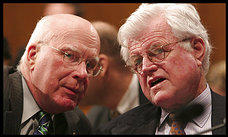
When the news first broke of John G. Roberts Jr.'s nomination by President Bush to replace the retiring Sandra Day O'Connor I initially thought he's only moderately right of center, with an ambiguous record of positions, and not a right-wing ideologue. I was also resigned to the fact that his confirmation was inevitable and that Democrats should move on to the next, bigger and more important battles. But in the month since the announcement, so much insight and documentation has surfaced about Roberts that I am now compelled to be firmly against his appointment and hope our side gives Republicans a helluva fight on the Hill. While the confirmation may still be inevitable--the Dem's only hold 44 of 100 Senate seats--we should nonetheless use the hearings, which commence September 6th, to aggressively question the nominee and force him to share his views and confirm that he'll put his judicial oath to the Constitution before his religion beliefs. Let's not make this easy. If we focus on the statements and documents that have been made public these past four weeks we can safely conclude that Roberts is one scary dude. On issues that include abortion, civil rights, voting rights, school prayer, church and state, big business, employee rights, school integration/busing and the environment he demonstrates an extremely radical conservative bent. Sandra Day O'Connor he's not. Don't expect many 5-4 rulings with Roberts playing swingman. Among those leading the Senate charge against Roberts are Ted Kennedy (D-MA), Patrick Leahy (D-VT), Chuck Schumer (D-NY) and Senate Minority Leader Harry Reid (D-NV). Leahy said Roberts' views were "among the most radical being offered by a cadre intent on reversing decades of policies on civil rights, voting rights, women's rights, privacy and access to justice." Leahy is co-chair of the Judiciary Committee and will lead the questions of Roberts at the hearings. Kennedy's been just as harsh, saying the documents on Roberts "show he was on or beyond the outer fringe of that extreme group eager to take our law and society back in time on a wide range of issues of individual rights and liberties, and on broad issues of government responsiveness to public needs." Schumer says, given what we now know about Roberts' record, the burden is on Roberts to prove he'll be a "restrained and independent" judge who "doesn't want to impose his personal views" on Americans. And Reid said: "All this talk about whether Democrats will support the Roberts nomination is laughably premature. . . . The White House has so far refused to produce relevant documents, and the documents we have seen raise questions about the nominee's commitment to progress on civil rights." Further, several leading Liberal advocacy groups are turning up the heat on Democrats to press for a more aggressive stance against Roberts. They include the Leadership Conference on Civil Rights; People for the American Way; Alliance for Justice; and the Human Rights Campaign. Most are planning to publicly reject the Roberts nomination even before the hearings begin. What's most frightening about a Roberts appointment is that it likely will set the judicial process in this country back 30-40 years, erasing all of the progressive gains we've made on important matters of health, civil rights and social reform. The fanatical Right wants desperately to overturn Roe v. Wade and other key landmark cases it deems "too liberal." That is why the Roberts fight is terribly important, especially as we ponder the likelihood that Bush may have two other opportunities soon to shift the Court even further to the right in the event Chief Justice William H. Rehnquist and the 85-year-old John Paul Stevens should also retire as expected. At that time, America will be a very, very scary place. Andy
No comments:
Post a Comment